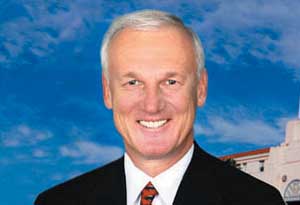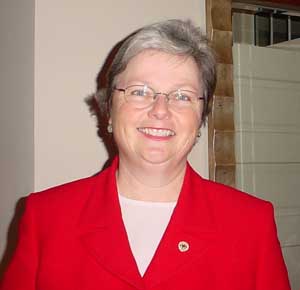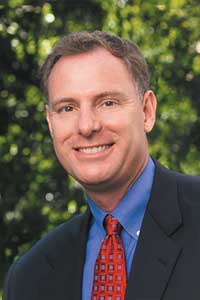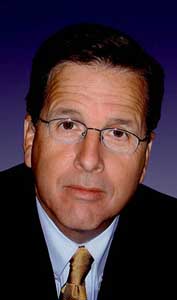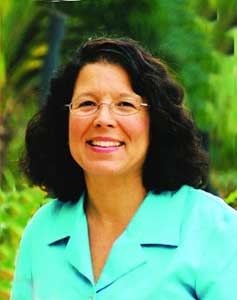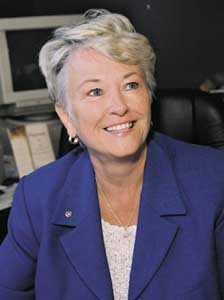-
- Same-sex marriage moves to top of election topics
- Domestic partner benefits involved in Proposal 2 debate
- Ohio Supreme Court rejects legal challenge to same-sex marriage
- Census snapshot of gay and lesbian service members and vets
- Schools should be kept out of same-sex marriage debate
- Mayor’s appointee resigns over New York domestic partner policy
- National News Briefs
- World News Briefs
feature
Make up your mind…
Published Thursday, 28-Oct-2004 in issue 879
Just days before the 2004 elections, many of us may feel excited, energized and inspired by the increased discussions and general hype that accompany elections on a national and local level. Then again, some of us are left feeling merely confused by the choices and the cacophony of messages. Wherever your political persuasions (or emotions) may fall, here’s a guide to some of our community’s most interesting (read: close) elections. The cast of characters include a mayoral race that’s gone from vanilla to something more Neapolitan as Frye enters the fray; Christine Kehoe’s bid for State Senate against a Republican candidate known for his association with disinfectants; a council race in the District 1 that features a Republican preaching tolerance and a Democrat who stands by the Boy Scouts; a particularly fraught fight for the 76th district that claims key members of the GLBT community on each side; and a city attorney’s race that raises the question, “Who’s going to get us out of this mess?” If you don’t know the answer to that last question and others yet, read on. This is the Gay & Lesbian Times’ guide to some of the most interesting candidates and key issues; but ultimately the answers lie with you. It’s time to decide.
— Janet Saidi, contributing writer
The mayoral race
Not a rerun of 2000 after all
Until a few weeks ago it looked as though the mayoral race was going to be an uninspiring sequel to the 2000 campaign, which pitted Ron Roberts against Dick Murphy. In the close race where every vote counted, both had been courting the GLBT community for support, and both were successful in making some inroads. Then along came Donna Frye, city council member, who jumped into the race as a write-in candidate with less than a month to go before Election Day.
The race has suddenly become a lot more exciting, as all of San Diego is wondering how things will play out in the three-way race, and as members of the GLBT community become even further divided in their loyalties to each of the respective candidates.
In the play for GLBT votes, Roberts could tout his long-standing relationship with the community, both as a city council member who voted in support of the city’s original Human Dignity Ordinance and as one of the first politicians to endorse Christine Kehoe in her bid to be the first out member of the GLBT community elected to office. As a member of the conservative County Board of Supervisors, Roberts has continued to be an ally of the community, voting to provide county employees with domestic partner benefits, supporting clean needle exchange programs and providing funding for HIV and AIDS services throughout the county.
In a candidate forum hosted by the San Diego Democratic Club (SDDC), Roberts was the only one of the two candidates in the mayoral race (the forum was held before Frye announced her candidacy) to attend, and he clearly defined the difference between his relationship with the GLBT community and that of Murphy’s.
“I’m not surprised that Dick Murphy’s not here tonight,” Roberts said. “I wasn’t surprised when Dick Murphy wasn’t in the Pride parade; I’m not surprised when I don’t see Dick Murphy but very seldom in this community. … I know this community and I’ve been part of it; I’ve represented it on the city council for two terms and now three terms on the board of supervisors. That’s not a reason that Dick Murphy shouldn’t come here; and you know that there’s a more basic reason.”
Roberts’ ties to the GLBT community garnered him the majority of the support in the 2000 race, but, going into 2004, his support from the GLBT community had weakened; and despite a 73-percent approval rating on the SDDC candidate questionnaire, Roberts failed to gain an acceptable rating from the club. (Club bylaws say that they cannot endorse Roberts because he is a Republican.) Winning him some favor with the GLBT community was Roberts’ opposition to the Federal Marriage Amendment even though he is not supportive of “same-sex marriage”; however, when it came to the Boy Scouts’ lease on land in Balboa Park, his views did hurt him somewhat.
“We’re going to find a solution to that problem, but throwing the Boy Scouts out of Balboa Park is not a solution,” Roberts said during a voter forum hosted by The Center and attended by both candidates.
Murphy, who was virtually ignored by the GLBT community in the 2000 race, earned some credibility with the community by appointing 23 members of the GLBT community to various city commissions and advisory boards during his current tenure as mayor. However, his stance on the Boy Scouts lease, medical marijuana and the clean needle exchange program hurt him in the eyes of many, because while he was supportive when it came to token appointments, he wasn’t perceived as being truly supportive of the community.
“When I ran for mayor, I admittedly did not know the LGBT community very well,” Murphy said at The Center’s mayoral forum. “During the last four years, we have had some issues that we have disagreed on, but I reached out to the LGBT community and I am proud to tell you that I value your contributions to the city.”
What might have been the final straw for the mayor was his unwillingness to take a position in the debate over the Federal Marriage Amendment, a decision that cost him the endorsement of San Diego’s GLBT Vote 2004.
At the forum, Murphy noted that he has made some decisions that might not have won him favor with the GLBT community, but said, “The point I want to make is that I may not be the ideal candidate for the LGBT community, but I will tell you the truth, and I can promise that we will work well together in the next four years.”
Without a doubt the mayoral race got its biggest shakeup with the unexpected entry of Frye. Her entry into the race caused a groundswell of grassroots support for the populist candidate who also happened to be the only Democrat in the race. Her favorable position on GLBT issues, including the city’s lease with the Boy Scouts, medical marijuana and clean needle exchange, instantly made her a popular choice with the GLBT community. Additionally, Frye became the first of the candidates to say that she was indeed a supporter of same-sex marriage and she won key endorsements from both Atkins and the SDDC.
“Our message is that we are a candidate of the people, by the people and for the people and when you write in the name Donna Frye, it’s finally someone to vote for,” Frye announced at a press conference held the day she pulled papers to enter into the race. “I’m going to draw votes away from both Dick Murphy and Ron Roberts. We need 34 percent of the vote to win…. We will get a higher mandate than that.”
She went on to say, “I believe, more now, more today, for the best interest of the public and our city, that I would do the best job as the next mayor of the City of San Diego. I believe I am a better candidate and could do a better job. They are both very nice men, but it’s time for someone else.”
While it is clear that Frye is a true ally to the GLBT community on its issues and that she has surpassed Roberts with her progressive views, there is still some division among the community about who to support. Although Murphy has fallen behind the other candidates when it comes to GLBT issues, Murphy continues to enjoy a strong base of GLBT support as well.
The Gay & Lesbian Times, as well as San Diego AIDS Foundation Chair Ben Dillingham (also a former chief of staff to Mayor Maureen O’Connor) have chosen to endorse Roberts to lead the city as our next mayor because of a perceived combination of experience and long-standing loyalty to the community. While Roberts may fall short of the progressive views of Frye, he is considered to be leaps and bounds ahead of Murphy on social issues, and is seen as a candidate who can bring to the table the experience that San Diego will need to deal with the financial crisis that it is currently facing due to the under-funding of the city’s pension fund.
39th State Senate District
A party-line vote – clear-cut but important
Former judge Larry Stirling is the Republican candidate for the 39th State Senate District seat and Assemblymember Christine Kehoe is the Democratic candidate. The 39th District represents more than 750,000 San Diegans in a diverse area that runs from Del Mar to Lemon Grove – roughly two-thirds of the City of San Diego.
Senator Dede Alpert has held the 39th Senate District seat for 14 years and currently chairs the Senate Appropriations Committee, the Joint Committee on the Master Plan for Education, the Select Committee on Family, Child and Youth Development, and the Select Committee on Genetics, Genetic Technologies and Public Policy.
“We’re very fortunate in this state when we look at our legislature… that the Democrats control both the Senate and the Assembly, but when you lose a few key races those things can change dramatically,” Alpert said at an August campaign kickoff for Kehoe. “Because of the way redistricting was done, one of the few competitive races in the state is the race that Christine is in.”
Both Kehoe and Stirling started out working on political campaigns, served on the San Diego City Council and then in the State Assembly.
Stirling, who has a background in public finance, served four terms in the Assembly before being elected to the State Senate in 1988.
During his tenure as a state senator, Stirling helped negotiate a “pretty good” retirement package for Superior Court judges through the State Assembly, then retired from the Legislature and accepted an appointment as a Superior Court judge, KPBS “Full Focus” host Gloria Penner noted at a recent GLBT voter forum held at The Center.
“He’s as diametrically opposite to her [Kehoe] politically as you can get,” Penner added. “He is truly a former legislator who believes in small government, cutting social programs and balancing the budget based on that.”
Stirling’s campaign focuses on enacting governmental spending limits; encouraging independent audits and competitive bidding requirements; reforming worker’s compensation, education and energy policies; better funding for police and fire departments; and affordable healthcare for seniors.
“We need to maintain a pro-choice, pro-civil rights, pro-education and pro-environment Legislature,” Kehoe said. “Let me tell you, when you get up to Sacramento, no matter what you think of these folks locally, the party line counts tremendously. The Republicans do not get to stray from the party line. We will never get a pro-choice vote out of a Republican member. They may not vote at all, which they consider a step in the right direction, which I consider useless. We will never get a pro-environment vote, we will never get a pro-gay vote, we will never get an education-funding vote.”
Stirling earned notoriety in the GLBT community in the ’90s when he ordered his courtroom disinfected after hearing a case that included a gay man who had AIDS. His actions earned him the nickname “Lysol Larry”.
Gov. Schwarzenegger, Congressmembers Randy “Duke” Cunningham and Darrell Issa, Republican Leader of the State Senate Dick Ackerman, Assemblymember Shirley Horton and County Supervisor Bill Horn have endorsed Stirling.
Kehoe has been endorsed by Senator Alpert, Senator Denise Ducheny of the neighboring 40th Senate District, Congressmember Bob Filner, Deputy Mayor Toni Atkins and Councilmember Scott Peters.
Kehoe authored the Insurance Equality Act (AB 2208) that Gov. Schwarzenegger signed into law last month. The bill ensures that domestic partners and married spouses are considered equal in all insurance policies issued in the state. She was recently appointed chair of the Joint Legislative Committee on Emergency Services and Homeland Security, which helps evaluate fire prevention and safety strategies, oversees rules and regulations governing the review and resolve of conflicting fire laws and regulations, and develops fire preparedness guidelines.
“There is no one more effective in government that I know than Christine Kehoe,” said Filner at Kehoe’s campaign kickoff. “She’s done a great job on behalf of her constituents. She knows what they think. She knows how to get what they want. She delivers and they reelect her and it’s as simple as that. Christine Kehoe has the right priorities. She’s going to be fighting for education and healthcare and safe neighborhoods and housing.”
Stirling, who has turned down requests by the San Diego chapter of Log Cabin Republicans to speak in the past, requested to speak at their May 3 meeting, where he presented briefly on the major issues of his campaign and defended his conviction that the Log Cabin Republicans should vote for him over Kehoe despite his opposition to civil unions and same-sex marriage.
At the meeting, Stirling said he would vote in favor of a federal marriage amendment banning same-sex marriages. He offered alternate legal solutions for same-sex couples to receive the tax and health insurance benefits that marriage provides to opposite-sex couples, without being granted domestic partnerships, civil unions or marriage, saying that he would “address whatever inequalities there are on a case-by-case basis.”
Stirling also provided alternate strategies for securing inheritance and hospital visitation rights without the aid of domestic partnership, civil union or marriage benefits – including writing partners into wills for inheritance rights and joint tenancy for home ownership – but said, “Everybody should be treated equally, simple as that” when asked whether he would rescind recent state laws that grant partial marriage rights to GLBT couples.
“It is difficult for members of the gay community, including Log Cabin Republicans, to support a candidate who doesn’t seem to want to support us,” said Garrick Wilhelm, Log Cabin Republicans’ state political affairs director, after Stirling spoke at the San Diego meeting.
The San Diego Log Cabin Republicans endorsed member Ralph Denney for the 39th Senate District seat in the March primary election, and have not endorsed a candidate for November election.
“He [Stirling] is not pro-choice, he is not pro-environment and he is not pro-education,” Kehoe said. “He’s out of step with the voters in this district.”
Kehoe has the advantage that the 39th District has more registered Democrats than Republicans, Penner said, but Stirling will give her a “tough fight.”
“I’ve campaigned in this district now; this will be my sixth time in 11 years, and I think I know these voters well and I believe that they know me,” Kehoe said. “This is a pro-choice, pro-education and pro-environment district, and that’s why we’re going to win.”
San Diego City Council Districts 1 and 4
District 4 election to be held Nov. 16
San Diego’s GLBT community is split in their endorsements for the city council races in Districts 1 and 4, with many of the major contenders vying for the gay vote.
Incumbent Councilmember Scott Peters, a Democrat, and his Republican challenger, Phil Thalheimer, have picked up GLBT community endorsements in the District 1 race, as have two primary Democratic candidates for District 4, Anthony Young and Dwayne Crenshaw. Former District 4 Councilmember George Stevens, also a Democrat, is another favorite in the District 4 race, but has not picked up significant GLBT community endorsements, largely due to his antigay rhetoric during his tenure on the city council.
Stephen Whitburn, president of the San Diego Democratic Club, has said that the gay vote in District 1 is “enough to swing the election in a reasonably close race.”
Thalheimer, a small business owner and philanthropist, has been endorsed by District Attorney Bonnie Dumanis, the statewide chapter of Log Cabin Republicans and City Commissioner Julia Legaspi.
Assemblymember Christine Kehoe and Deputy Mayor Toni Atkins have endorsed Peters for reelection.
Like Peters, Thalheimer supports needle exchange programs and medical marijuana use when prescribed by doctors. Thalheimer has formally come out in favor of AB 205 and against the Federal Marriage Amendment.
“I am opposed to any discrimination in our society, and believe that gay couples should have the same legal rights and privileges as straight couples,” Thalheimer told the Gay & Lesbian Times.
However, Thalheimer scored 53 out of 100 on the San Diego Democratic Club’s (SDDC) candidate questionnaire this year, though as a Republican he was not eligible for endorsement. “Thalheimer opposes same-sex marriage, civil unions, gays in the military, gay adoption, hate crimes legislation and more,” Whitburn said. “He wrote that whether he’d hire a GLBT staff person ‘depends on the position they applied for.’ Peters is certainly better for the GLBT community than Thalheimer would be and the SDDC will be communicating that to voters.”
Peters, an SDDC member, declined to complete their candidate questionnaire this year. “In light of recent events at City Hall, there are new and serious questions about the propriety of an elected official making commitments with regard to specific issues or projects in exchange for some consideration,” Peters said in a letter sent to the SDDC regarding the questionnaire. “Because your questionnaire was submitted to me as part of a process that could lead to an endorsement and, presumably, contributions from your members, I think it is not appropriate for me to respond at this time.”
The Boy Scouts’ preferential lease in Balboa Park has been a hot-button issue and a litmus test by which many in the GLBT community judge city council candidates. Thalheimer has said he believes the Boy Scouts should be paying fair market rent if they’re going to be in the park.
Peters voted in favor of allowing the Boy Scouts to retain their $1-a-year lease in the park despite openly discriminating against gay and atheist members, a decision that Peters still sticks to. Though he is generally regarded as having a good voting record on GLBT issues, his vote in the Boy Scouts case angered many in the GLBT community.
“I made a hard choice between my personal opposition to the Scouts’ policies and my desire not to disrupt a program that serves thousands of San Diego young people,” Peters told the Gay & Lesbian Times about his vote. “Subsequent to that decision, the Scouts’ national office reversed itself and claimed religious status, thus creating insurmountable constitutional issues with the lease. As a result, I was part of the council majority that agreed to a settlement with the ACLU that removes the city from any further defense of the lease.”
Deputy Mayor Atkins said she endorsed Peters because “he has been extremely supportive in meeting the needs of our older urban communities” and “has shown great interest in issues that affect the residents of District 3, including affordable housing, police and fire protection, and making sure our older infrastructure needs are being met.”
Peters said he opposes a federal constitutional amendment prohibiting same-sex marriage and supports civil unions.
Young, Councilmember Charles Lewis’ chief of staff who is currently managing the District 4 office after Lewis died suddenly in early September, has also picked up the endorsement of Deputy Mayor Atkins.
Crenshaw, a community development director who ran for the District 4 seat in 2002 against Lewis, has been endorsed by SDDC.
Both candidates advocate for better education in public schools, economic development and job creation, and increased neighborhood development and safety.
Regarding GLBT issues, Atkins said in working with Young, she has “found him to be supportive of LGBT issues and quite willing to work with our community.”
Whitburn said Crenshaw “will provide the GLBT community with additional representation on the city council. … Most importantly, he will vote with us on the issues.”
Both candidates support civil unions as opposed to same-sex marriage, but for different reasons.
Crenshaw said in an interview with the Gay & Lesbian Times that marriage should not be the government’s business, and churches and couples should be able to choose whether or not to perform marriage ceremonies. “What I’m about, what I think the fair-minded people in the 4th District are about, is treating people equally under the law, and I think the difference is that they see, as I do, that marriage is a religious institution; they don’t want that touched,” he said. “What we do want is people to be treated the same and have the same access to benefits that the government offers to couples, whether they be gay or lesbian, or heterosexual.”
“I don’t support same-sex marriages, and I do it because of my religious and my personal upbringing,” Young told the Gay & Lesbian Times. “I just don’t feel comfortable with it. I do believe in civil unions. I think any two people who agree with each other on how they want to interact with each other and bind with each other, they should be able to do that. So I think that’s really the way to go for our gay and lesbian community. But you know what? It’s a debate that’s open, and I’m listening to folks and I’m learning a lot about the community.”
When asked about a recent letter to the editor published in the San Diego Union-Tribune, which said Crenshaw is gay and also contained factual inaccuracies, Crenshaw responded: “I think the retraction was that it was factually untrue; it was untrue; I’m proud of my endorsement from the San Diego Democratic Club; I’m proud of my commitment to GLBT issues; I will be a good leader on those on the council; and that’s about all I have to say about that.”
There are five other candidates in the District 4 race: Jim Galley, a water treatment plant operator; Patrick DeShields, a publisher and editor; Bruce Williams, community affairs director for Mayor Dick Murphy; Gloria Tyler-Mallery, a real estate broker; and Marissa Acierto, a businesswoman. If no candidate wins the Nov. 16 election outright, a runoff election will be held Jan. 4.
The Gay & Lesbian Times has yet to endorse a candidate for District 4, due to the election being held on Nov. 16. The Gay & Lesbian Times will invite both Young and Crenshaw to a discussion and following make an official endorsement.
City attorney
Cleaning out the city’s closet
The race for city attorney is inextricably linked to the City of San Diego’s current fiscal crisis, with candidates Mike Aguirre, a local lawyer, and Leslie Devaney, executive assistant city attorney to City Attorney Casey Gwinn, pledging to reform some of the messes the city attorney’s office has found itself in. Gwinn is barred from running for reelection because of term limits.
“In San Diego, we have as a community, as a local government, deviated from the law; repeatedly, routinely deviated from the law, and as a result, we are under investigation,” Aguirre said at a July 8 meeting of the Tom Homann Law Association, commenting on the federal investigation the City of San Diego is under, and the $1.5 billion pension deficit that threatens the city’s budget. “There is no other city in California that has the colossal problems that we have here in San Diego. We have those problems because our city attorney failed to enforce the law.”
Devaney says the city attorney needs to be an independent, neutral advisor who does not expressly serve the interests of city government and that she will refuse to set policy based on political agendas. She also says she wants to end “closed-door” San Diego City Council sessions. Gwinn has conceded that the city council’s observance of the Brown Act – a law requiring public access to meetings and elected officials to let the public speak – has been the minimal amount required by law.
Gwinn ruffled some feathers when he advised the city council against settling with the plaintiffs involved in the Mount Soledad cross case. The settlement, which would have removed the cross from Mount Soledad, was agreeable to all parties involved at the time; Gwinn has been accused of making the recommendation, which the council decided to follow, based on his religious beliefs.
“Personally, just personally, I hope that the cross will stay on Mount Soledad,” Devaney said in a Sept. 7 interview with the San Diego Union-Tribune’s editorial board. “I’m disappointed in the en banc decision that found differently than both the trial court and appellate court, that a sale of the property underneath the cross to separate it from church and state was somehow unconstitutional. But it is not the city attorney’s job to put personal opinion into the legal opinion or to overrule the will of the voters who have spoken.”
A federal court struck down a previous sale, saying the deal favored religious groups. The issue has been put before voters Nov. 2 as Proposition K.
Aguirre told the Union-Tribune that the measure should not have been put on the ballot because it turns a legal issue into a political one, and that the city should have allowed those involved to work out their own compromise.
Devaney has received the endorsements of Congressmember Randy Cunningham, Assemblymembers Jay LaSuer and Juan Vargas, County Supervisors Dianne Jacob and Bill Horn, and conservative talk show host Rick Roberts, among others.
The Tom Homann Law Association, Deputy Mayor Toni Atkins, Assemblymember Christine Kehoe, Congressmember Bob Filner and former city attorney candidate Deborah Berger, among others, have endorsed Aguirre.
Aguirre captured 46 percent of the vote in the March primary; Devaney garnered 26 percent.
Both candidates feel the case involving the Boy Scouts lease was handled inappropriately based on San Diego’s Human Dignity Ordinance.
When asked about her endorsement by Rick Roberts at the Tom Homann Law Association meeting, Devaney said she is proud of all of her endorsements. “The fact that any one group supports me does not define me, and it never will,” she said, adding that she does not listen to Rick Roberts’ radio show and is unaware of his criticism of the GLBT community. “If you tell me what he said, I will go on [the air] and say, ‘I completely disavow hate language; I completely disavow any sort of bashing of the gay and lesbian community; that is totally inappropriate.’”
Aguirre, however, has not fared much better in the Rick Roberts arena during this campaign, having given back a $500 campaign contribution because it came from a fundraiser hosted by a local gay couple with connections in the adult video industry after Roberts confronted him on air.
“I think either of them would do a credible job as city attorney. But Mike has a longer history with our community; I think he would be a stronger advocate for our community,” said Ted Roberts, co-president of the Tom Homann Law Association.
Aguirre has been a longtime member of the San Diego Democratic Club and has marched in Pride parades over the years.
Devaney does not have much prior involvement with the GLBT community, but has said she will make sure that GLBT representation is present both in her office and through ongoing dialogue with community liaisons. “It’s imperative that we have liaisons to those communities so that we know the issues involved, so that we don’t have to wait until there is an issue,” she said.
The State Assembly
Saldaña and Davis get the nod
Of the major races this year, the State Assembly races could have the most important impact of GLBT civil rights this year. Both the 76th and 78th Assembly District seats are among the seven “swing” seats in California’s Legislature that are being heavily targeted by both Democrats and Republicans in the upcoming Nov. 2 election. While the Assembly races are overshadowed by more hyped races like the presidential and even mayoral contest, in close races like those in the 76th and 78th Assembly Districts every vote will count, as Republicans battle for control of the two districts that have traditionally voted Democrat.
Politically active members of the GLBT community will recall the 2002 showdown between Vince Hall and Shirley Horton in the 78th Assembly District. In a race in a district that was drawn up to give Hall a distinct advantage, Republican contender Horton defeated him. In the two years that Horton has served in the State Assembly she has voted against every piece of GLBT legislation brought before her, even innocuous items such as proclamations declaring June LGBT Pride Month in the state of California, and sending a resolution to Congress voicing California’s opposition to the Federal Marriage Amendment.
Now with the 76th District up for grabs (as Chris Kehoe vacates her seat due to term limits), the Republican Party is vying for control of another San Diego Assembly district that has traditionally voted Democrat. Lori Saldaña is running as the Democratic candidate in the district while Tricia Hunter is the Republicans’ choice. Like Horton, Hunter is running as a “moderate” candidate and campaign yard signs are not identifying her as a Republican but as “independent.” Meanwhile, GLBT leadership from Sacramento, including State Senator Sheila Kuehl and Assemblymember Mark Leno, who are campaigning for Saldaña in San Diego, continue to stress the partisan nature of politics at the state capitol.
“They think they are doing us a favor by abstaining,” Leno said about Republicans who claim to be moderates, at a recent fundraiser for Saldaña. “On so many things they abstain. Of course they are not doing it for our sake, they are doing it, they think, for their sake so they can say, ‘I didn’t vote against this.’ We need their yes vote. If they aren’t going to vote yes, vote no, it makes no difference to us.”
Leno went on to add: “It is still very important that we clarify to people that even though there are these districts that are considered swing districts, battle zone districts … Republicans only have a chance if they present themselves as ‘moderate,’ pro-choice and supposedly in support of the environment and civil rights. When they get to Sacramento they have no choice, no choice whatsoever. Their leadership gives them marching orders and no one dares to cross that line.”
Hunter, who has previously run for the State Assembly in San Diego and lost, has represented Riverside in the State Assembly and says that her voting record on issues –including a woman’s right to choose, right of access, funds for Planned Parenthood and against the party on gun control issues – shows that she is not afraid to go against the party line.
“I have voted against the party numerous times …” Hunter said in an interview with the Gay & Lesbian Times, “I have a long history of voting against the party. That is not an issue for me.” Hunter added: “I am an independent voter. When you run for office you run on issues that you support and I’ve made that commitment.”
One issue that Hunter has not made a commitment on is the issue of the state granting marriage licenses to same-sex couples. During the last session of the Assembly, Leno introduced AB 1967, the Marriage License Non-Discrimination Act, which seeks to amend Section 300 of the California Family Code to redefine marriage as a civil contract between two persons rather than between a man and a woman. AB 1967 was pulled after passing through the Assembly’s Judiciary Committee due to a lack of support in the general Assembly, but Leno has pledged to reintroduce the bill this year with the backing of Assembly Speaker Fabian Nunez.
“I think the issue of marriage itself is up to the church,” Hunter said of the issue of same-sex marriage. “It’s a religious issue. The only thing the state has addressed, as I understand it, is the legal issues around it. That’s my understanding, but again I have committed to having a group that will advise me as these bills come up… I think that’s being pretty open.”
When pressed on the issue of same-sex marriage licenses, Hunter said, “I’m not going to change my position – how many ways do you want me to say it? I am opposed to a constitutional amendment. I think it is an issue that should be decided by churches locally. I support every right, legal right, for domestic partnership, for civil unions, for whatever word you want to use.”
In contrast, Saldaña has said she would support Leno’s bill when it is reintroduced.
“When it comes to supporting equal marriage rights, and I remind people that it was 50 years ago that California was the first state to do away with laws on the books banning interracial marriage,” Saldaña said at a campaign fundraiser. “The federal Constitution gives us the right to the pursuit of happiness, the state constitution gives us the right to happiness, and what guarantees more happiness than finding a person that you love so much that you want to commit your life to them? I feel that it is a constitutional infringement by telling people that they can’t commit and marry someone that they absolutely love and can’t imagine living without. So to me, it’s just a straightforward discussion.”
As Saldaña and Hunter duke it out for control of the 76th District, in the 78th District, Democratic candidate Patty Davis is attempting to oust Republican Shirley Horton. Davis, who has held fundraisers within the GLBT community, is a bit of an unknown for most voters.
“I am fully supportive of domestic partnerships, civil unions, with all the benefits of,” Davis said in a recent interview with the Gay & Lesbian Times. “I think that’s really important. I’m very much a civil-rights issue person. I know that my city, Chula Vista; we give domestic partners the same benefits that the city would give a spouse.”
When further asked about the reintroduction of the Marriage License Non-Discrimination Act, Davis said: “I have not read that bill. I will tell you I have not come out to support gay marriage. I’ve come out to support civil unions with all of the benefits of.”
Davis did go on the record to say that she is a pro-choice candidate and is opposed to gender discrimination. While she may not be 100-percent at this point on GLBT issues like same-sex marriage, her moderate stance has gained her the endorsement of the San Diego Democratic Club, which has rated her as a priority candidate. Equality California has also endorsed Davis in her race to defeat Horton.
“Patty Davis is a supporter of the LGBT community and is running a strong race to unseat an Assemblymember who is out of touch with her constituents and who has failed to vote for a single LGBT civil rights bill while in office,” said Geoffrey Kors, Equality California’s executive director. “In fact, her opponent [Hunter] refused to support a resolution in opposition to the discriminatory Bush-backed Federal Marriage Amendment.”
Gay & Lesbian Times endorsement summary For the online version of our 2004 voter guide, click this link to download the voter guide in Acrobat PDF format.
If you do not have Acrobat Reader, you can download it for free:
|
|
Copyright © 2003-2025 Uptown Publications

